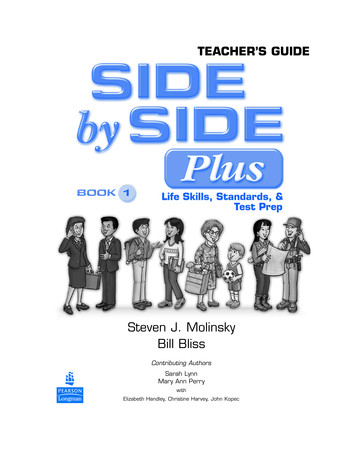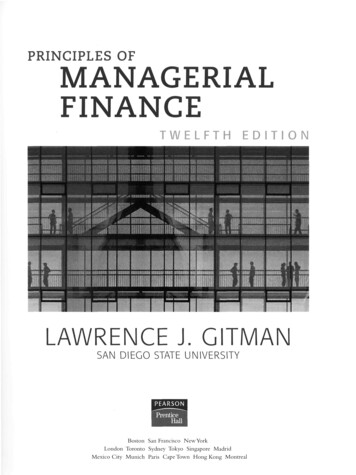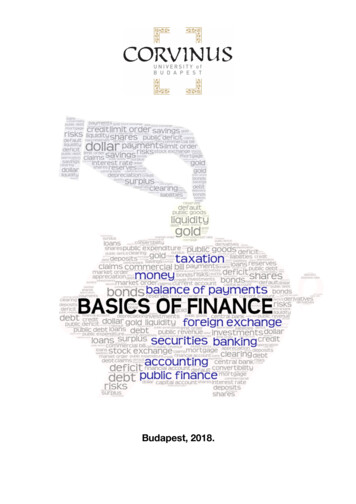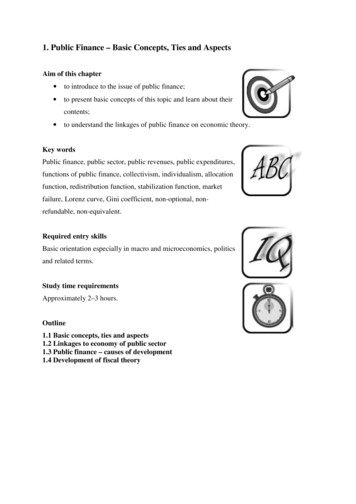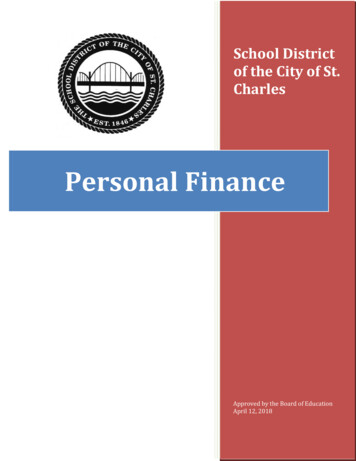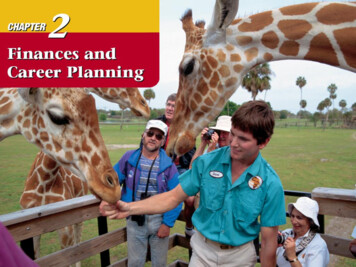
Transcription
Personal Finance Unit 1 Chapter 2 2007 Glencoe/McGraw-Hill0
Chapter 2Finances and Career PlanningWhat You’ll Learn Section 2.1 Identify the personal issues to consider whenchoosing and planning your career. Explain how education and training affect careeradvancement. Discuss the factors that influence employment. Section 2.2 Describe effective strategies to obtain employment. Identify sources of career opportunities. Identify the financial and legal issues to considerwhen looking for employment.Personal Finance Unit 1 Chapter 2 2007 Glencoe/McGraw-Hill1
Planning for Life Q: Career plans are for people who do not know what theywant. I know already that I want a high-paying job. So whyshould I bother thinking about career planning? A: Money is just one motivation for work. You need toconsider many other factors as well. Career planningconsiders your personal values, goals, and interests, thebasics for any career decision. Since you will probably spendthe majority of your life working, consider the old adage:“Choose a career you love, and the money will follow.”Go to finance07.glencoe.com to complete the Standard &Poor’s Financial Focus activity.Personal Finance Unit 1 Chapter 2 2007 Glencoe/McGraw-Hill2
Section 2.1Planning Your CareerMain IdeaWhy will choosingthe right careerhelp you find bothpersonalsatisfaction andfinancial security?Choosing and planning for the right career willhelp you find fulfillment both personally andfinancially.Personal Finance Unit 1 Chapter 2 2007 Glencoe/McGraw-Hill3
Section 2.1Planning Your Careerjobwork that you domainly to earnmoneycareera commitment towork in a field thatyou findinteresting andfulfillingChoosing a CareerSome people find true satisfaction in their work,while others work just to make money.You can choose whether to: Get a job just to earn money. Prepare for a career.Ensuring that your career will fulfill yourpersonal and financial goals requires planning.Personal Finance Unit 1 Chapter 2 2007 Glencoe/McGraw-Hill4
Section 2.1Planning Your CareerCareer Decision Trade-OffsYour choice of career will affect: The amount of money you make The people you meet How much spare time you havePersonal Finance Unit 1 Chapter 2 2007 Glencoe/McGraw-Hill5
Section 2.1Planning Your Careerstandard oflivinga measure ofquality of lifebased on theamounts andkinds of goodsand services aperson can buyChoosing a CareerPeople make career decisions based onwhether they want to: Simply maintain a standard of living Pay for the hobbies and activities theyenjoy Pursue careers that provide them withboth money and personal fulfillment Select careers that reflect their interests,values, and goalsPersonal Finance Unit 1 Chapter 2 2007 Glencoe/McGraw-Hill6
Section 2.1Planning Your Careertrendsdevelopmentsthat markchanges in aparticular areaOpportunity CostsChoosing a career will involve trade-offs, oropportunity costs.Recent trends indicate that some people aremaking career decisions that allow them to: Spend more time with their families Enjoy their hobbies and interests Run their own businessThe more you know about your own interests,values, needs, and goals, the better you will beable to choose a career that will provide abalance between personal satisfaction andfinancial rewards.Personal Finance Unit 1 Chapter 2 2007 Glencoe/McGraw-Hill7
Section 2.1Planning Your Careerpotential earningpowerthe amount ofmoney you mayearn over timeCareer Training and Skill DevelopmentAcquiring more education will help you to: Increase your potential earning power. Meet your financial goals. Increase your chances for success.Your field of study will also affect your salary.Personal Finance Unit 1 Chapter 2 2007 Glencoe/McGraw-Hill8
Section 2.1Planning Your CareerChecklist for SuccessYou will be an asset to any employer if you: Work well with others Strive to do your best Are creative when solving problems Communicate well Understand yourself and other peopleThese basic qualities and skills make successmore likely in most job situations.Personal Finance Unit 1 Chapter 2 2007 Glencoe/McGraw-Hill9
Section 2.1Planning Your Careeraptitudesthe naturalabilities thatpeople possessinterestinventoriestests that help youidentify theactivities youenjoy the mostPersonal FactorsYou can take special tests to learn more aboutyour: Abilities Interests Personal qualitiesThese tests—called aptitude tests and interestinventories—may give you an edge in choosinga career.Personal Finance Unit 1 Chapter 2 2007 Glencoe/McGraw-Hill10
Section 2.1Planning Your CareerStages of Career PlanningBefore you make any decisions about yourcareer, you should review your situation.Your progress will depend on: Your opportunity costs The choices that are available to you Your career areaTalking to people in your field of interest canhelp you with your career planning.Personal Finance Unit 1 Chapter 2 2007 Glencoe/McGraw-Hill11
Personal Finance Unit 1 Chapter 2 2007 Glencoe/McGraw-Hill12
Section 2.1Planning Your CareerExternal Factors and OpportunitiesBefore you begin your job search, you shouldtake into consideration: Social influences Economic factors TrendsThese factors directly affect the job market andthe opportunities that are available to you.Personal Finance Unit 1 Chapter 2 2007 Glencoe/McGraw-Hill13
Section 2.1Planning Your CareerExternal Influences on Your CareerWhen you consider your career options, youneed to focus on: Your skills Your training Your experience Social influences Economic conditions Industry trendsYou may have no control over the “big picture”factors, but you can make some personaldecisions based on real-world influences.Personal Finance Unit 1 Chapter 2 2007 Glencoe/McGraw-Hill14
Section 2.1Planning Your Careerdemographictrendstendencies ofpeople groupedby age, gender,ethnicity,education, orincome thatchange over timeSocial InfluencesDemographic trends can affect youremployment opportunities. Some examples ofdemographic trends that have affected the jobmarket are: More working parents More leisure time More elderly people in the overallpopulation Greater demand for ongoing employmenttrainingPersonal Finance Unit 1 Chapter 2 2007 Glencoe/McGraw-Hill15
Section 2.1Planning Your Careergeographictrendstendencies ofpeople movingfrom one area ofthe country toanother asfinancial centersshift locationGeographic TrendsGeographic location also influences earninglevel. In recent years, geographic trends haveindicated that some of the fastest-growing jobmarkets are in: Florida Nevada Arizona Arkansas New Jersey CaliforniaRemember to consider differences in earninglevels and costs of living as you decide where tolook for employment.Personal Finance Unit 1 Chapter 2 2007 Glencoe/McGraw-Hill16
Section 2.1Planning Your CareerEconomic FactorsSince the job market changes as the economydoes, the demand for certain types of jobschanges.Some economic factors that can reduce careeropportunities are: High interest rates Price increases Decreased demand for certain goods andservicesBeing aware of current economic trends willhelp you to choose a career so that you canachieve your financial goals.Personal Finance Unit 1 Chapter 2 2007 Glencoe/McGraw-Hill17
Career CenterAt your school’s career center, you will find a variety of freeinformation that can help you with college choices, résumépreparation, job opportunities, and career counseling.How can researching different careers that interest you help yourfinancial planning for the future?Personal Finance UnitUnit11ChapterChapter22 20072007Glencoe/McGraw-HillGlencoe/McGraw-Hill1818
Section 2.1Planning Your Careerserviceindustriesbusinesses thatprovide servicesfor a fee, offeremploymentpotential incoming yearsTrends in Industry and TechnologyChanges in industry and technology also affect thejob market.While opportunities have dwindled in some areas ofthe economy, such as manufacturing, opportunitiesin other areas—such as service industries—havegrown. Some examples of service industriesinclude: Computer or telecommunications technology Health care Social services Hospitality services Management Education Financial servicesPersonal Finance Unit 1 Chapter 2 2007 Glencoe/McGraw-Hill19
Section 2.2Employment and Career DevelopmentMain IdeaWhat are somestrategies youthink might beeffective inobtainingemploymentexperience?Learn effective strategies to help you get the job orcareer that meets your personal and financial goals.Personal Finance Unit 1 Chapter 2 2007 Glencoe/McGraw-Hill20
Section 2.2Employment and Career DevelopmentEmployment Search StrategiesAs you take steps to search for a job, your levelof success will depend upon: How well you communicate the value ofthe experience you already have How effectively you use provenemployment strategiesPersonal Finance Unit 1 Chapter 2 2007 Glencoe/McGraw-Hill21
Section 2.2Employment and Career DevelopmentObtaining Employment ExperienceAs you enter the world of work, you may worrythat you do not have enough experience.You may be overlooking the importance ofvarious kinds of work-related training, including: Part-time work Volunteer work Internships and cooperative education Class projects or after-school activitiesPersonal Finance Unit 1 Chapter 2 2007 Glencoe/McGraw-Hill22
Section 2.2Employment and Career DevelopmentTypes of Work-Related TrainingWhen you volunteer with places such as nonprofitcommunity organizations and government agencies,you can: Learn new skills Develop good work habits Make professional contactsWorking as a “temp” is a good way to gain experienceand learn more about a particular field.Personal Finance Unit 1 Chapter 2 2007 Glencoe/McGraw-Hill23
Section 2.2Employment and Career Developmentinternshipa position in whicha person receivestraining by workingwith people whoare experienced ina particular fieldcooperativeeducationprograms thatallow students toenhanceclassroom learningwith part-time workrelated to theirmajors andinterestsInternships and Cooperative EducationAn internship may: Give you the experience you need toobtain employment Lead to permanent employment Allow you a chance to practice yourapplication and interviewing skillsCooperative education programs are anotherway to apply the workplace skills you learn inclass to an actual business environment.Personal Finance Unit 1 Chapter 2 2007 Glencoe/McGraw-Hill24
Section 2.2Employment and Career DevelopmentClass Projects or After-School ActivitiesClass assignments and school activities can besources of work-related experience. They canhelp you gain valuable career skills such as: Managing, organizing, and coordinatingpeople Public speaking Goal setting, planning, and supervising Financial planning and budgeting Conducting researchPersonal Finance Unit 1 Chapter 2 2007 Glencoe/McGraw-Hill25
Section 2.2Employment and Career DevelopmentCareer Information SourcesYou need up-to-date information to make thebest career decisions. Many sources ofinformation are available to you, including: Mass media The Internet School guidance offices Community organizations Professional organizationsPersonal Finance Unit 1 Chapter 2 2007 Glencoe/McGraw-Hill26
Section 2.2Employment and Career DevelopmentContactsContacts are another good source of advice andinformation as you prepare for a career. Yourcontacts are your: Family Friends Coworkers Teachers Professors Former employersPersonal Finance Unit 1 Chapter 2 2007 Glencoe/McGraw-Hill27
Section 2.2Employment and Career Developmentnetworkinga way of makingand using contactsto get jobinformation andadviceinformationalinterviewa meeting withsomeone whoworks in your areaof interest who canprovide you withpracticalinformation aboutthe career orcompany you areconsideringNetworkingEven people whom you do not know can assistyou in a job search. That is why it is never toolate to begin networking.Your contacts may: Know someone who can hire you Be able to arrange an informationalinterviewPersonal Finance Unit 1 Chapter 2 2007 Glencoe/McGraw-Hill28
Section 2.2Employment and Career DevelopmentIdentifying Job OpportunitiesIf you are going to find employment that is rightfor you, you need to know where to look for jobopenings. Explore sources such as: Job advertisements Job fairs Employment agenciesPersonal Finance Unit 1 Chapter 2 2007 Glencoe/McGraw-Hill29
Section 2.2Employment and Career DevelopmentJob AdvertisementsAll newspapers have classified ads that includejob listings; some list both local jobs and thosefrom a wide geographic area.You can also use the Internet as a valuablesource for job opportunities. On the Internet, youcan: Use a search engine to find a company’sWeb site and learn more about it Find a company’s list of current jobopenings Use job-search Web sites with jobadvertisements, advice, and résuméservicesPersonal Finance Unit 1 Chapter 2 2007 Glencoe/McGraw-Hill30
Section 2.2Employment and Career DevelopmentJob FairsAt a job fair, recruiters from local and nationalcompanies set up tables or booths where youcan: Discuss job opportunities Submit your résuméTo make the most of a job fair, be prepared tomake your best impression on several recruitersin a short amount of time. They may call you infor an in-depth interview at a later date.Personal Finance Unit 1 Chapter 2 2007 Glencoe/McGraw-Hill31
Section 2.2Employment and Career DevelopmentEmployment AgenciesEmployment agencies are businesses thatmatch job hunters with employers. Theemployment agency fee may be paid by: The company that hires you You You and your new employerDo not get involved with agencies that ask youto pay a fee without promising you a job inreturn.To find out more about employment agencies,contact your state’s employment service ordepartment of labor.Personal Finance Unit 1 Chapter 2 2007 Glencoe/McGraw-Hill32
Section 2.2Employment and Career DevelopmentOther Ways to Find a JobYour ability to find a job is limited only by yourimagination and energy. Other ways to find a jobinclude: Visiting specific companies where youwould like to work Calling local businesses in your field ofinterest Talking to people with similar interestswho have already graduated from yourschoolPersonal Finance Unit 1 Chapter 2 2007 Glencoe/McGraw-Hill33
Section 2.2Employment and Career Developmentrésuméa one- or twopage summary ofyour education,training,experience, andqualificationsApplying for a JobMaking the best possible presentation of yourskills and experience is the key to landing a job.Your résumé is your most important tool. Thetwo basic types of résumés are the: Chronological résumé Skills résuméYour résumé provides prospective employerswith an overview of the special contribution youmay be able to make to their companies.Personal Finance Unit 1 Chapter 2 2007 Glencoe/McGraw-Hill34
Section 2.2Employment and Career Developmentcover letterthe personal letterthat you presentalong with yourrésuméCover LettersYou will want to include a cover letter with yourrésumé when you send it to an employer by: Regular mail E-mail FaxThe cover letter tells a potential employer whyyou are interested in a particular job and whyyou think that it would be worthwhile for him orher to interview you.Personal Finance Unit 1 Chapter 2 2007 Glencoe/McGraw-Hill35
Section 2.2Employment and Career Developmentinterviewa formal meetingwith your potentialemployer thatallows you toexpress why youthink you are thebest person forthe jobPreparing for the InterviewIf you are granted an interview, you shouldobtain as much information as you can aboutthe company or industry before your interview.Possible resources include: The library The Internet Informal interviews with people who arefamiliar with that company or industryPersonal Finance Unit 1 Chapter 2 2007 Glencoe/McGraw-Hill36
Section 2.2Employment and Career DevelopmentThe InterviewHere are some typical questions an employermight ask: What education and training qualify youfor this job? Why are you interested in working for thiscompany? Other than past jobs, what experienceshave helped prepare you for this job? What are your major strengths? Majorweaknesses?After the interview, send your interviewer a notereiterating your interest and expressing yourthanks for the opportunity to interview.Personal Finance Unit 1 Chapter 2 2007 Glencoe/McGraw-Hill37
Section 2.2Employment and Career DevelopmentConsidering a Job OfferBefore you accept an offer, you have toconsider several factors. Find out all you canabout: The company The job itself The working environment The salary Any other benefitsPersonal Finance Unit 1 Chapter 2 2007 Glencoe/McGraw-Hill38
Section 2.2Employment and Career DevelopmentThe Work EnvironmentAs you go on interviews, you will noticedifferences in workplaces.Ask about official company policies: How does the company handle payincreases? How does it measure the quality ofemployees’ work? How does it decide which employees topromote?Personal Finance Unit 1 Chapter 2 2007 Glencoe/McGraw-Hill39
Section 2.2Employment and Career DevelopmentFactors Affecting SalaryYour beginning salary will depend on: Your education and experience The size of the company The average salary for the job you areconsideringTo make sure that you are starting with a fairsalary, talk to people with similar jobs at othercompanies or look for related information on theInternet.Personal Finance Unit 1 Chapter 2 2007 Glencoe/McGraw-Hill40
Section 2.2Employment and Career DevelopmentRaises and PromotionsRaises and promotions are a direct result of howwell you do your job. Once you have accepted ajob offer and started to work: Meet regularly with your supervisor Ask for feedback on your performanceand any suggestions for improvement Let your supervisor know that you areinterested in increased responsibilityPersonal Finance Unit 1 Chapter 2 2007 Glencoe/McGraw-Hill41
Section 2.2Employment and Career DevelopmentMeasuring Employee BenefitsYou should also evaluate the types of benefitsthe company offers besides a paycheck and payparticular attention to: Health care Retirement benefits The specific needs of your familyPersonal Finance Unit 1 Chapter 2 2007 Glencoe/McGraw-Hill42
Section 2.2Employment and Career Developmentcafeteria-styleemployeebenefitsprograms thatallow workers tochoose thebenefits that bestmeet theirpersonal needsMeeting Employee NeedsChanges in society have brought about changesin the types of benefits that employees receive.Some of these changes include: Cafeteria-style employee benefits Social Security benefits Pension planspension plana retirement planthat is funded atleast in part by anemployerPersonal Finance Unit 1 Chapter 2 2007 Glencoe/McGraw-Hill43
Section 2.2Employment and Career DevelopmentComparing BenefitsYou can compare the dollar value of employeebenefits in several ways. These ways includefinding: The market value Whether the benefits are tax-exempt ortax-deferredA 401(k) plan is an example of a tax-deferredbenefit.Personal Finance Unit 1 Chapter 2 2007 Glencoe/McGraw-Hill44
Section 2.2Employment and Career DevelopmentYour Rights as an EmployeeAs an employee, you have certain legal rights; youalso have certain legal rights during the hiringprocess: An employer cannot refuse to hire a womanor terminate her employment because she ispregnant. An employer cannot discriminate against aperson for any reason related to age, race,color, religion, gender, marital status,national origin, or any mental or physicaldisabilities. An employer must pay for unemploymentinsurance, contribute to Social Security, andprovide for workers’ compensation funds incase of a work-related injury or illness.Personal Finance Unit 1 Chapter 2 2007 Glencoe/McGraw-Hill45
Section 2.2Employment and Career DevelopmentLong-Term Career DevelopmentA job is for today, but a career can last alifetime. As you enter the world of work, askyourself: Will you always enjoy the work that youdo today? Will you be successful in the career youselect?You cannot predict the future, but you candevelop skills and attitudes that will increaseyour chances of being satisfied with your work inyears to come.Personal Finance Unit 1 Chapter 2 2007 Glencoe/McGraw-Hill46
Section 2.2Employment and Career DevelopmentGuidelines for Career SuccessHere are some basic guidelines to follow forcareer success: Make a point of improving yourcommunication skills—both written andoral. Do your best to get along with yourcoworkers. Remain flexible and open to new ideas. Develop good work habits. Be creative in solving your own problems. Be willing to learn new techniques andtechnologies.Personal Finance Unit 1 Chapter 2 2007 Glencoe/McGraw-Hill47
Section 2.2Employment and Career DevelopmentTraining OpportunitiesA key to your ongoing success will be yourability to keep up with changes in technologyand to adapt to the global economy.Take advantage of your company’s: Regular training programs Professional seminars Help with payment for college coursesYou should also continue to read and learn asmuch as you can on your own.Personal Finance Unit 1 Chapter 2 2007 Glencoe/McGraw-Hill48
Section 2.2Employment and Career DevelopmentCareer Paths and AdvancementAs time goes by, you will experience changes inyour personal interests, values, and goals.Outside factors, such as economic conditionsand social trends, will also influence: Your career choices Other financial decisions that you makeYou will probably go through a series of careerstages and experience specific tasks andconcerns with each one.Personal Finance Unit 1 Chapter 2 2007 Glencoe/McGraw-Hill49
Section 2.2Employment and Career Developmentmentoran experiencedemployee whoserves as ateacher andcounselor for aless-experiencedpersonMentorsOne way to make sure that your careerdevelops in the right direction is to gain supportfrom a mentor.A mentor can: Give you one-on-one training Help you to meet other knowledgeablepeople Provide you with emotional supportduring difficult times at workSome of the best mentors are retired peoplewho are eager to share a lifetime of knowledgeand experience.Personal Finance Unit 1 Chapter 2 2007 Glencoe/McGraw-Hill50
Section 2.2Employment and Career DevelopmentChanging CareersMost workers change jobs several times overthe course of their lives. The following are somesigns that it may be time to move on: You feel bored or depressed at work. Your job adversely affects you physicallyor emotionally. You receive a series of poor performanceevaluations. You have little opportunity to obtain araise or promotion. You have a poor relationship with yoursupervisor or coworkers.Personal Finance Unit 1 Chapter 2 2007 Glencoe/McGraw-Hill51
Section 2.2Employment and Career DevelopmentThe Time Between JobsBeing out of work can cause emotional andfinancial stress. While you are looking for a job: Continue to eat, sleep, and exercise asusual. Stay involved in family and communityactivities. Improve your skills through personalstudy, classes, or volunteer work. Think about opportunities with nonprofitor government organizations.Whether looking for a new job or your first job,always consider how the financial and personalcosts and benefits of your career choice willaffect your needs and goals.Personal Finance Unit 1 Chapter 2 2007 Glencoe/McGraw-Hill52
Chapter 2Finances and Career PlanningKey Term Review jobcareerstandard of livingtrendspotential earning poweraptitudesinterest inventoriesdemographic trendsgeographic trendsservice industries internshipcooperative educationnetworkinginformational interviewrésumécover letterinterviewcafeteria-style employee benefitspension planmentorPersonal Finance Unit 1 Chapter 2 2007 Glencoe/McGraw-Hill53
Chapter 2Finances and Career PlanningReviewing Key Concepts1.List some of the personal issues you will need to considerwhen planning your career.Personal issues to consider when choosing a career include your: Aptitudes Interests Personality Current financial situationPersonal Finance Unit 1 Chapter 2 2007 Glencoe/McGraw-Hill54
Chapter 2Finances and Career PlanningReviewing Key Concepts2.Describe factors that affect your potential earning power.Your potential earning power will be influenced by: Your level of education and training The field of study you selectPersonal Finance Unit 1 Chapter 2 2007 Glencoe/McGraw-Hill55
Chapter 2Finances and Career PlanningReviewing Key Concepts3.Explain how current demographic trends might influenceyour choice of career.Demographic trends can affect your employment opportunitiesSome examples of demographic trends that have affected the jobmarket are: More working parents More leisure time More elderly people in the overall population Greater demand for ongoing employment trainingPersonal Finance Unit 1 Chapter 2 2007 Glencoe/McGraw-Hill56
Chapter 2Finances and Career PlanningReviewing Key Concepts4.List some ways you might obtain job-related experience.You can gain experience through: Part-time work Volunteer work Internships Cooperative education Class projectsPersonal Finance Unit 1 Chapter 2 2007 Glencoe/McGraw-Hill57
Chapter 2Finances and Career PlanningReviewing Key Concepts5.Identify sources of information to find out more about thecareer in which you are interested.To evaluate career opportunities, use sources such as: The Internet Libraries Newspapers School guidance offices Community organizations Networking with people working in the field youchoosePersonal Finance Unit 1 Chapter 2 2007 Glencoe/McGraw-Hill58
Chapter 2Finances and Career PlanningReviewing Key Concepts6.Explain your rights as an employee.As an employee, you have certain legal rights; you also havecertain legal rights during the hiring process: An employer cannot refuse to hire a woman orterminate her employment because she is pregnant. An employer cannot discriminate against a person forany reason related to age, race, color, religion,gender, marital status, national origin, or any mental orphysical disabilities. An employer must pay for unemployment insurance,contribute to Social Security, and provide for workers’compensation funds in case of a work-related injury orillness.Personal Finance Unit 1 Chapter 2 2007 Glencoe/McGraw-Hill59
Newsclip: Career EdgeStudents who develop strong job-search skills have a careeradvantage. They develop clear career direction. They alsocommunicate and promote their competitive edge to employers.Log On Go to finance07.glencoe.com and open Chapter 2.Learn more about career strategies. Write a paragraph about howyou can boost your chances of getting hired.Personal Finance Unit 1 Chapter 2 2007 Glencoe/McGraw-Hill60
Personal Finance Unit 1 Chapter 2 2007 Glencoe/McGraw-Hill 4 Choosing a Career Some people find true satisfac


